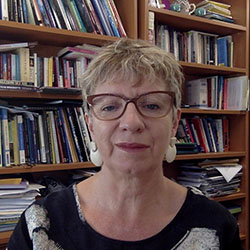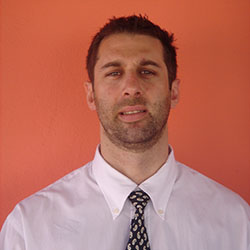2018 Summit program
Download the Inclusive Education Summit 2018 program.
Call for papers
You are invited to submit a proposal for the Inclusive Education Summit 2018 to be held at Deakin University Waterfront Campus in Geelong.
Important dates
| Date | |
|---|---|
| April 2018 | Registration and Call for Proposals opens |
| Friday 27 July | Author Notification |
| Friday 3 August | Call for Proposals closes |
| Friday 10 August | Authors to confirm their acceptance into the Program |
| Friday 21 September | Early Bird registration closes |
Keynote speakers
Professor Michalinos Zembylas - Open University of Cyprus
Michalinos Zembylas is Professor of Educational Theory and Curriculum Studies at the Open University of Cyprus. He is Visiting Professor and Research Fellow at the Institute for Reconciliation and Social Justice, University of the Free State, South Africa and Research Associate at Nelson Mandela University (NMU) – Chair, Critical Studies in Higher Education Transformation.
He has written extensively on emotion and affect in relation to social justice pedagogies, intercultural and peace education, human rights education and citizenship education. His recent books include: Psychologized Language in Education: Denaturalizing a Regime of Truth (with Z. Bekerman), and Socially Just Pedagogies in Higher Education (co-edited with V. Bozalek, R. Braidotti, and T. Shefer). In 2016, he received the Distinguished Researcher Award in “Social Sciences and Humanities” from the Cyprus Research Promotion Foundation.
Abstract:
A Posthumanist Critique of Human Rights: Towards an Agonistic Account of Rights in Inclusive Education
Responding to recent human rights critiques, this talk draws on some of the literature in posthumanism to critique the liberal framework as well as the moral superiority of humanism on which the human rights regime has been built.
Posthumanism is based on two important premises that favour an agonistic account of rights: the first is that human beings are regarded in social and relational rather than in atomistic terms or as individuals without connections; secondly, a reading of human rights through this perspective highlights a critical post-humanist engagement with human rights, conducted in the name of an unfinished and ambiguous humanity connected to other sentient beings and the environment, rather than a singular or absolute political identity of humanity.
This reading recognizes the social, economic and political consequences of human rights and thus their potential to upset the dominant social, economic and political order, rather than accepting human rights as universal norms of social life while ignoring the ideological frame in which they are exercised. The talk will conclude with a discussion of some implications for inclusive education.
Associate Professor Susanne Gannon - Western Sydney University

Susanne Gannon is Associate Professor in Education at Western Sydney University, and was Equity theme leader of the Centre for Educational Research from 2012-2017.
Social justice issues and inclusive educational practices and policies have driven several careers in secondary schools and in academia. Her research interests include gender, sexualities, sustainability, poverty and place in education, and aspiration and higher education. Theoretically, her work explores the research implications of poststructural and new materialist paradigms. She draws on a range of qualitative research methodologies including collective biography, autoethnography, narrative and poetic methods and media and textual analysis.
Her coedited books include Resisting Educational Inequality: Reframing policy and practice in schools serving vulnerable communities (2018, with Hattam & Sawyer), Contemporary Issues of Equity in Education (2014, with Sawyer), Becoming Girl: Collective Biography and the production of Girlhood (2014, with Gonick), Deleuze and collaborative writing (2011, with Wyatt, Gale & Davies), Pedagogical Encounters (2009, with Davies), and Doing Collective Biography (2006, with Davies). She is current co-editor of Gender and Education and regional editor for the International Journal of Qualitative Studies in Education.
Matthew Wright

Matthew is the Branch Manager Engagement and Inclusion at the NDIA and has responsibility for Strategic Engagement, National Events and Inclusion. Matthew has over 20 years’ experience in the disability sector. He was previously the Chief Executive Officer of the Australian Federation of Disability Organisations and Murray Human Services, and a senior manager with Oakleigh Centre and Able Australia. Matthew was an Adviser Diversity at National Australia Bank developing the NAB's Disability Action Plan.
Matthew has represented Australians with disability at the U.N Conference of State Parties, has been a member of the AHRC Reference Panel on the National Enquiry into Employment Discrimination, IAC’s Housing Innovations Working Group, the Australian Law Reform Commissions Disability Advisory Committee, the National Disability Workforce Strategy Committee, the Victorian Governments NDIS Implementation Task Force, and was one of the three members of the National Disability and Carers Alliance.
Matthew holds a Bachelor of Arts and Post-Graduate Diploma in HRM and IR from the University of Melbourne. He is a fellow of the Williamson Community Leadership Program with Leadership Victoria and has a severe hearing loss from birth and identifies as part of the Deaf community.
TIES 2018 conference organising committee
TIES 2018 is proudly convened by Dr Ben Whitburn, a member of Deakin’s Inclusive Education Teaching and Research Group.
| Conference Chair | |
|---|---|
| Dr Ben Whitburn | School of Education Deakin University |
| Committee | |
|---|---|
| Dr Tim Corcoran | School of Education Deakin University |
| Dr Matthew Thomas | School of Education Deakin University |
| Associate Professor Louise Paatsch | School of Education Deakin University |
| Dr Leanne Coll | School of Education Deakin University |
| Ms Merrin McCracken | Equity and Diversity Deakin University |
Contact details
To learn more about the conference and get in touch, please contact the conference organisers at ties2018@events.deakin.edu.au.
Phone: +61 9244 5148


